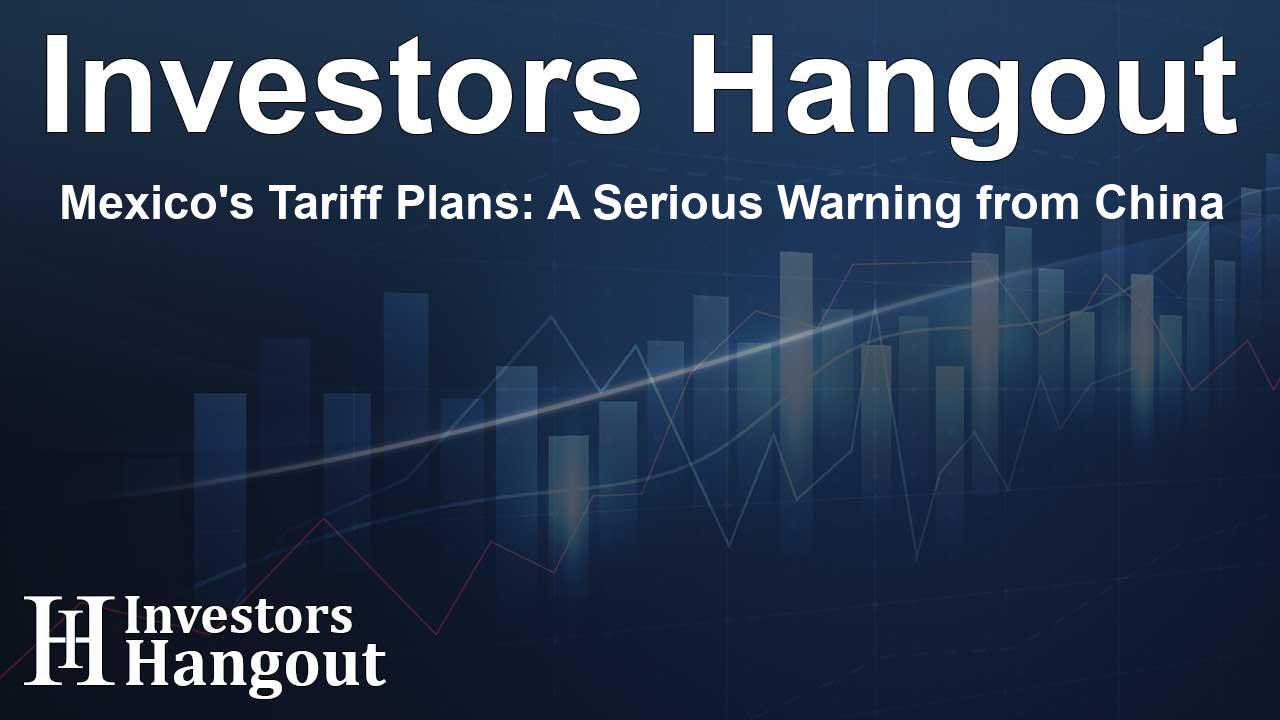Mexico's Tariff Plans: A Serious Warning from China

China's Warning to Mexico Regarding Tariffs
Recently, China cautioned Mexico to reconsider its decision to impose a staggering 50% tariff on Asian-made vehicles. China's Ministry of Commerce emphasized the potential disruption this could cause to the robust trade relationship, which is valued at approximately $52 billion. This warning reflects the escalating tensions between nations concerning trade regulations and policies.
Beijing's Strong Stand on Tariffs
The warning came in the wake of Mexico’s public announcement about its plans to increase tariffs on vehicles produced in Asia, with a specific focus on imports from China. The proposed hike from the current 20% to 50% represents a significant leap as part of a broader budget proposal aimed at increasing revenue. This news was notably reported, raising concerns about the potential consequences of such a steep duty.
Impact on the Mexican Automotive Sector
Marcelo Ebrard, the Secretary of Economy in Mexico, stated that the proposed tariff increase would require approval from Congress and is set to be enacted 30 days post-approval. The automotive industry is pivotal to the Mexican economy, employing a vast number of workers more than any other sector. Insights from Jorge Guajardo, who has held roles as Mexico's ambassador to China and a partner at a global advisory firm, further underline the gravity of this tariff move.
Interestingly, Guajardo noted that while the 50% tariff in Mexico seems significant, it is still less than the 60% imposed by Russia on Chinese vehicles. This indicates a complex landscape, as various countries implement different tariffs without facing similar backlashes.
Investment from Chinese Manufacturers at Stake
Over $7 billion of investments have been announced by Chinese auto parts manufacturers in Mexico between mid-2022 and 2024. These investments signal confidence in the Mexican market. However, uncertainty looms regarding the completion of these projects, especially given BYD Co. Ltd.'s recent postponement of its factory construction plans in Mexico. Such delays have raised eyebrows and prompted questions about the impact of tariffs on future investments.
Trade Dynamics and Broader Implications
As Mexico navigates these challenging waters, the conflict occurs against a backdrop of rising trade tensions between the U.S. and China. For instance, data has shown that Chinese exports to the United States saw a staggering 33% decline year-over-year in a recent month. Meanwhile, U.S. imports into China also dropped significantly during this time frame, emphasizing the fragile nature of international trade relations.
Additionally, a notable 50% of U.S. companies operating in China are now calling for tariff reductions on Chinese goods, prompted by unpredictability in revenue stemming from ongoing trade disputes. This highlights a growing concern among businesses that rely on balanced trade relationships.
Conclusion: Navigating Uncertainty in Trade Relations
The impending tariff hike by Mexico poses profound implications for both the Mexican and Chinese automotive sectors. As both nations assess their strategies, the international community is closely watching how these developments unfold. The delicate balance of trade policies can shape the automotive landscape significantly, particularly for companies like BYD Co. Ltd. Whether these tariffs will be implemented remains to be seen, but one thing is clear: international trade relations are under a microscope.
Frequently Asked Questions
What prompted China's warning to Mexico?
China warned Mexico against implementing a 50% tariff on Asian cars, suggesting it could harm bilateral trade worth $52 billion.
How will the proposed tariffs affect the Mexican economy?
The tariffs require Congressional approval and could impact the automotive sector, which is a major employer in Mexico.
What are the concerns regarding Chinese investments in Mexico?
There are uncertainties about the completion of over $7 billion in Chinese investments, especially with delays from companies like BYD.
How do these tariffs compare to those imposed by other countries?
Mexico's proposed tariffs are lower than Russia's 60% tariffs on Chinese cars, indicating diverse international tariff strategies.
What is the broader context of U.S. and China trade relations?
The tariff discussions occur amid heightened trade tensions, with significant declines in both Chinese exports to the U.S. and U.S. imports to China.
About The Author
Contact Lucas Young privately here. Or send an email with ATTN: Lucas Young as the subject to contact@investorshangout.com.
About Investors Hangout
Investors Hangout is a leading online stock forum for financial discussion and learning, offering a wide range of free tools and resources. It draws in traders of all levels, who exchange market knowledge, investigate trading tactics, and keep an eye on industry developments in real time. Featuring financial articles, stock message boards, quotes, charts, company profiles, and live news updates. Through cooperative learning and a wealth of informational resources, it helps users from novices creating their first portfolios to experts honing their techniques. Join Investors Hangout today: https://investorshangout.com/
The content of this article is based on factual, publicly available information and does not represent legal, financial, or investment advice. Investors Hangout does not offer financial advice, and the author is not a licensed financial advisor. Consult a qualified advisor before making any financial or investment decisions based on this article. This article should not be considered advice to purchase, sell, or hold any securities or other investments. If any of the material provided here is inaccurate, please contact us for corrections.
